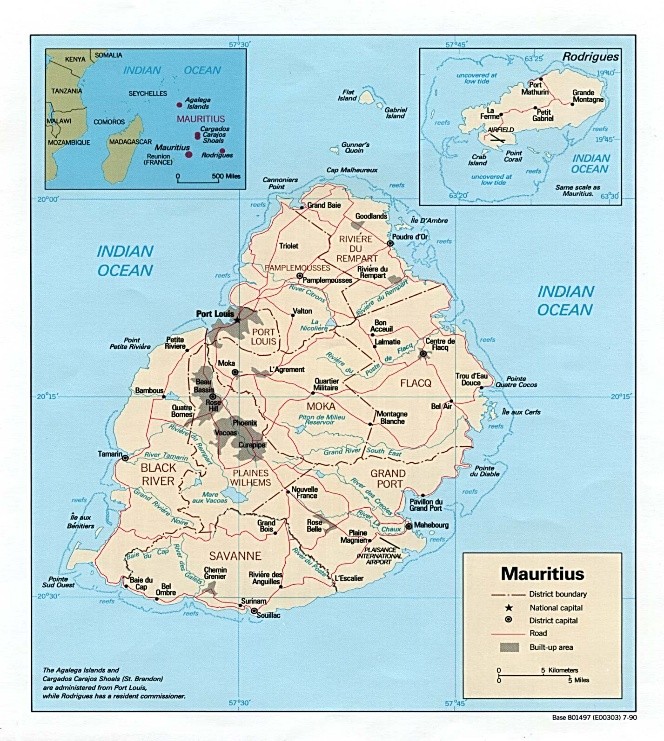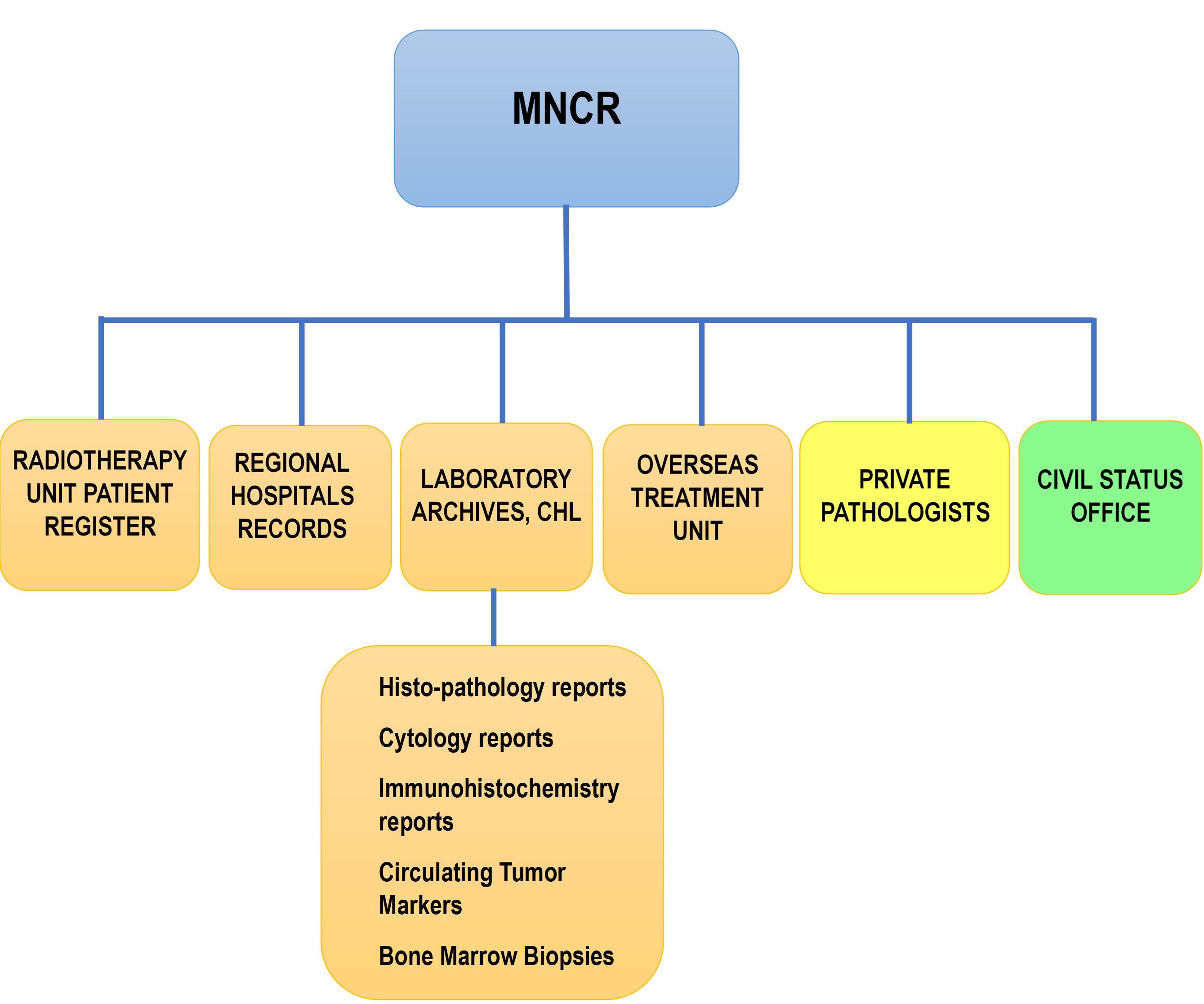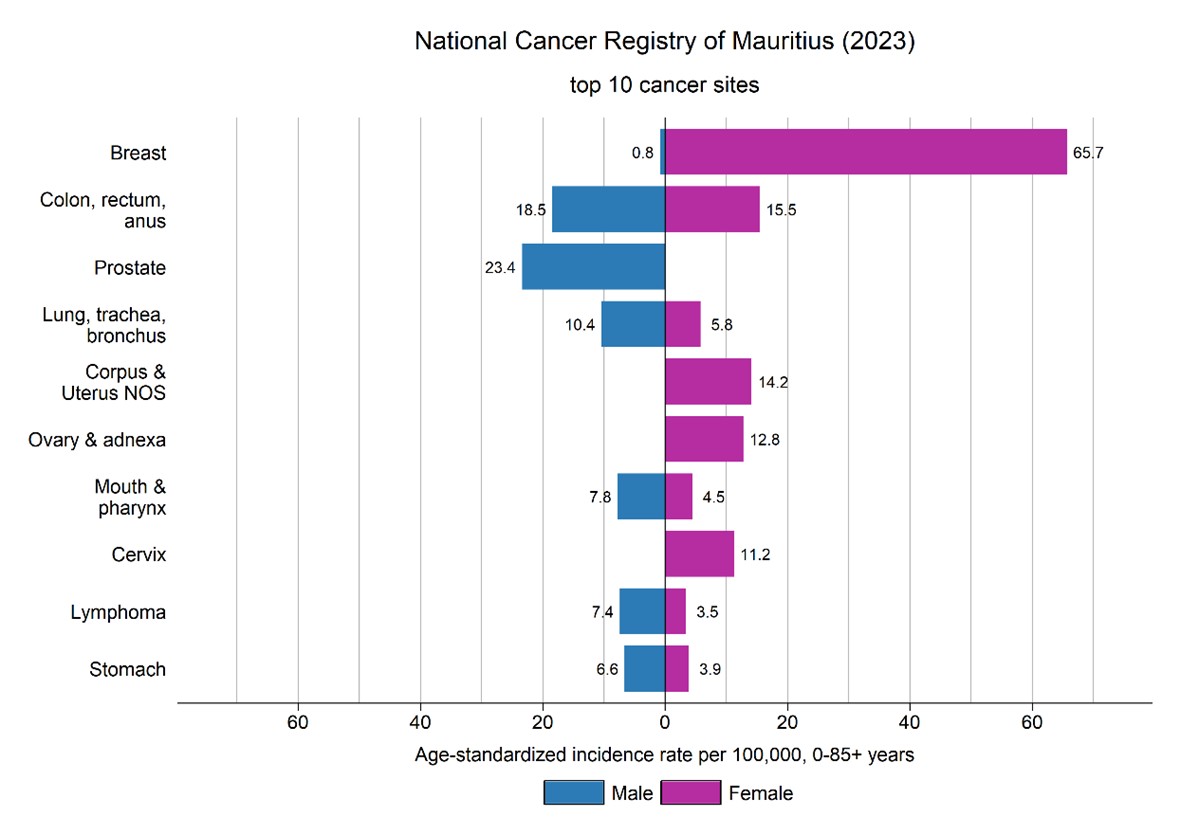HISTORY
The Mauritius National Cancer Registry (MNCR) was established in 1993 under the leadership of Dr. Shyam Manraj, with support from French cooperation. Initially set up as a pathology-based registry within the Central Health Laboratory at Victoria Hospital, it gained affiliation with the International Association of Cancer Registries (IACR) in 1997. The MNCR published its first report in 1999, presenting data from 1989 to 1996.
In 2001, the registry transitioned into a population-based cancer registry, significantly enhancing its ability to monitor cancer trends and support public health planning. Data processing began with CanReg software, and in 2010, the registry implemented CanReg5 to improve data quality, management, and analysis. In recognition of its data quality and consistency, MNCR’s information was included in the 12th edition of the Cancer Incidence in Five Continents (2024), a globally respected series that features high-quality cancer registry data from around the world.
The MNCR has also played a key role in advancing cancer surveillance in the region. In 2011, it hosted the 33rd Annual Meeting of the IACR in Balaclava, bringing together international cancer registry experts. Its membership in the African Cancer Registry Network (AFCRN) since 2013 has further strengthened its regional and international partnerships, contributing to improved cancer data collection and public health research across Africa.
POPULATION AND HEALTH INFRASTRUCTURE
 The registry covers the entire population of the Republic of Mauritius, including Rodrigues and its outer islands, ensuring comprehensive national cancer surveillance. According to the Ministry of Health and Wellness’ Health Statistics Report 2023, the estimated average mid-year population in 2023 was 1,260,767, comprising 622,817 males and 637,950 females.
The registry covers the entire population of the Republic of Mauritius, including Rodrigues and its outer islands, ensuring comprehensive national cancer surveillance. According to the Ministry of Health and Wellness’ Health Statistics Report 2023, the estimated average mid-year population in 2023 was 1,260,767, comprising 622,817 males and 637,950 females.
Mauritius benefits from a centralized pathology service that underpins cancer diagnosis within the public health sector. Specialized cancer treatments, including oncosurgery, radiotherapy, and brachytherapy, are provided at the National Cancer Centre (NCC). To improve accessibility, chemotherapy services have been decentralized and are now available at all five regional hospitals, enabling patients to receive care closer to home.
In addition to the public healthcare system, two private cancer clinics offer services for cancer prevention, diagnosis, and treatment. These facilities provide patients with additional options and help to expand the overall capacity for cancer care in the country.
PERSONNEL
The Mauritius National Cancer Registry is led by Dr. Marvin Koon Sun Pat, who serves as the National Cancer Registry Coordinator. The registry team consists of two full-time registrars, all of whom are trained and proficient in using CanReg software for efficient data management and analysis. To support their fieldwork, registry staff have access to transport facilities, allowing them to carry out regular visits to various health institutions across the country.
LOCATION OF THE REGISTRY
The registry is located at the Ministry of Health and Wellness, within the NeXsky Building in Ebene. It operates out of a dedicated office equipped with Information Technology resources and internet connectivity, which supports the smooth execution of cancer registration and surveillance activities.
SOURCES OF INFORMATION
 The sources of information are multiple and include the following:
The sources of information are multiple and include the following:
- Radiotherapy Unit Patient Register
- Regional Hospital Health Records Department
- Laboratory archives, Central Health Laboratory (CHL)
- Overseas Treatment Unit, MOHW
- Private Pathologists
- The Civil Status Office, Prime Minister’s Office
METHODS OF REGISTRATION
- Collection of Data
The registry primarily collected data through passive surveillance. However, since July 2024, the MNCR has also incorporated active data collection strategies to enhance data completeness and accuracy. This includes direct abstraction of clinical and pathological data from medical records by registry staff at the National Cancer Centre in Solferino.
- Classification and Coding:
Cancer cases were coded using both the International Classification of Diseases for Oncology, 3rd Edition (ICD-O-3) and the International Classification of Diseases, 10th Revision (ICD-10). All data were processed and stored using CanReg5 software. For cases where TNM staging information was unavailable, particularly during active data collection, the Essential TNM system was applied to ensure consistency in staging.
- Quality control:
To ensure data quality and validity, multiple quality control measures were implemented:
- Validation during data entry into the registry database.
- Application of IARC and ENCR consistency check programs upon registration of new cases.
- Ongoing correction of ad hoc errors identified during data analysis or routine review.
CONFIDENTIALITY
The registry adheres to international standards for data confidentiality, specifically the IACR/IARC Guidelines (2004) for handling identifiable cancer data. These guidelines govern the secure collection, storage, use, and transmission of data.
Requests for access to registry data must be made in writing. Any request involving identifiable information requires special approval and is subject to strict safeguards to protect patient confidentiality.
RECENT RESULTS
The burden of cancer in Mauritius has increased significantly over the past two decades. The total number of cancer cases more than doubled, rising from 1,394 in 2001 to 2,841 in 2023. Across all years, women consistently accounted for more cancer cases than men.
In 2023, prostate cancer was the most commonly diagnosed malignancy among men (ASIR=23.4 per 100,000), followed by cancers of the colon, rectum, and anus (ASIR=18.5 per 100,000), and lung cancer (ASIR=10.4 per 100,000). Among women, breast cancer was the most frequently diagnosed malignancy (ASIR=65.7 per 100,000), followed by cancers of the colon, rectum, and anus (ASIR=15.5 per 100,000), and cancer of the corpus uteri (ASIR=14.2 per 100,000).
Among men, the leading causes of cancer mortality were prostate cancer (ASMR = 11.9 per 100,000), followed by cancers of the colon, rectum, and anus (ASMR = 11.0 per 100,000), and lung cancer (ASMR = 10.7 per 100,000). In women, the most common sites of cancer-related deaths were breast cancer (ASMR = 20.2 per 100,000), followed by cancers of the colon, rectum, and anus (ASMR = 7.0 per 100,000), and lung cancer (ASMR = 5.2 per 100,000).

CANCER REGISTRY PUBLICATIONS
- Breast cancer survival analysis in the Republic of Mauritius by age, stage at diagnosis and molecular subtype: A retrospective cohort study. Koon Sun Pat M, Manraj M, Manraj S. Int J Cancer. 2024 Sep 7. doi: 10.1002/ijc.35172. Epub ahead of print. PMID: 39243396.
- Trends in cancer incidence in the Republic of Mauritius, 1991–2015. Koon Sun Pat M, Manraj M, Fauzee J, Sewsurn S, Parkin DM, Manraj S. Cancer Epidemiol. 2019 Dec;63:101616. doi: 10.1016/j.canep.2019.101616. Epub 2019 Oct 5.
- Abstract published in Journal of Clinical Oncology 32,2014 (Suppl; Abstr-e11560) “Trends in female breast cancer in the Republic of Mauritius over past two decades” (http://meetinglibrary.asco.org)
- Cancer incidence in the Republic of Mauritius – 5 years review 1997 to 2001. S.S. Manraj, S.B.Poorun, M.R.Eddoo, N.Jeebun, L.Moussa. (http:www.akspublication.com/paper03_jan-jun2006.htm)
- A scientific article entitled “Incidence des Cancers à Maurice en 1989-1993” has been published in the international Journal “Revue d’Epidemiologie et de santé publique” in June 1997.(Link: http://www.pathexo.fr/documents/articles-bull/T91-1-MR96-090.pdf)
CONTACT DETAILS
Coordinator: Dr M. Koon Sun Pat
Address: National Cancer Registry, Ministry of Health & Wellness, Nexsky Building, Ebene, Mauritius
E-mail: This email address is being protected from spambots. You need JavaScript enabled to view it.
Updated 20 April 2025
